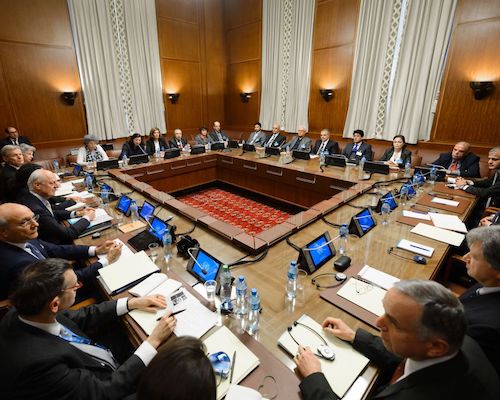 Syria is moving to the fourth round of the Geneva talks. Two days of inclusive talks in Riyadh, bringing to the negotiation table the expanded Syrian opposition, including the Astana delegation and the Syrian Higher Negotiations Committee, finished yesterday.
Syria is moving to the fourth round of the Geneva talks. Two days of inclusive talks in Riyadh, bringing to the negotiation table the expanded Syrian opposition, including the Astana delegation and the Syrian Higher Negotiations Committee, finished yesterday.
The opposition was harmonizing its positions on the threshold of the new Astana round, setting the priorities for Geneva Talks and discussing the outcomes of the previous Astana meeting.
The Astana meeting did not replace the format, but became a supplementary in-strument, a back-up tool for the Geneva negotiations. Astana permitted the realiza-tion of ceasefire, and the first round of talks resulted in the elaboration of trilateral monitoring mechanisms of the ceasefire regime in Syria, guaranteed by Turkey, Russia and Iran.
On February 15-16, the Kazakh Foreign Ministry will host another round of talks, welcoming delegations from the Syrian government and the rebel side, along with the UN Special envoy for Syria, Staffan de Mistoura, and the delegations of three guarantors.
Jordanian and the US delegations are also invited to take part in Astana II.
Resolving problems
The Astana format is set to solve the problems preventing the Geneva format from being a success, by instituting the communication process and resolving ground is-sues, mostly related to the military sphere, and paving the way for political resolu-tion and the long-awaited and inevitable transitional process.
The Geneva talks are set to be held on February 20. A lot has changed since the previous round. The third round practically did not leave hope for a political solu-tion. The Opposition, both moderate and otherwise, was so much fragmented, that it could not come to any agreement even within its own ranks. The International community was supporting separate opposition groups, thus somehow fragmenting them even more and politicizing the whole negotiation process, putting it in the framework of global geopolitical rivalries.
The major changes in the global sphere, the focus of the US on presidential elections first and then on the cataclysms in face of Trump’s administration, with the West watching the goings on in Washington, together with changes on the ground in Syria have significantly changed the situation and prospects of the negotiations.
The foreign states have cut their financial support to the rebel groups, and there are practically no more voices calling to topple the Syrian regime by force.
As was stated by prominent Syrian dissident Louay Hussein, “the armed conflict for the state is over”, and the majority in the opposition are going back towards a political struggle. Even though Hussein’s conclusions are premature, his words have a grain of truth.
The Syrian opposition has become more united and amenable. However, the Islamist fractions, that have formed a new alliance recently, are reportedly going to launch new attacks on the government’s positions. But most likely from the general perspective, such a decision is counterproductive primarily for themselves.
Maria Dubovikova
The Syrian opposition has become more united and amenable. However, the Islamist fractions, that have formed a new alliance recently, are reportedly going to launch new attacks on the government’s positions. But most likely from the general perspective, such a decision is counterproductive primarily for themselves. Such attempts to disrupt negotiation and political process do not correspond to the expectations of the majority of the rebels and opposition forces. They alienate themselves from the political process, lose credibility, drifting to the terrorist Islamist formations in the company of which they have all chances to end up their fight. But this will hardly inflict significant damage to the negotiation process.











